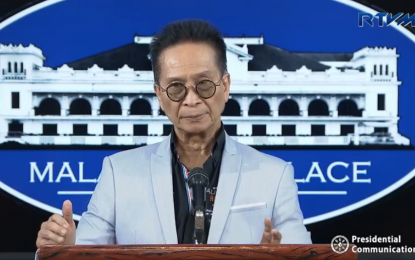
Presidential Spokesperson Salvador Panelo
MANILA -- Malacañang on Monday condemned the perpetrators behind a series of blasts that rocked Cotabato City, North Cotabato and Maguindanao and injured several people, including soldiers, on Sunday.
“We will pursue the perpetrators and will harness all our might to crush all evil forces or enemies of the state, as well as their supporters,” Presidential Spokesperson Salvador Panelo said in a statement. “Any attempt to sow fear, hatred and violence is doomed to fail."
Panelo urged residents to remain vigilant and report suspicious personalities and unattended items.
He assured that authorities are now investigating the matter as casualties continue to undergo treatment.
Meanwhile, he said President Rodrigo Duterte will push through with his schedule to visit areas where the bombings took place after he distributes land certificates of land ownership award (CLOAs) to beneficiaries there.
Reports showed that at least 23 individuals, including nine soldiers, were wounded in the series of explosions, nine days before martial law in Mindanao ends on Dec. 31.
Despite the explosions, the Philippine National Police (PNP) said it will not recommend an extension of martial law in Mindanao.
The Armed Forces of the Philippines (AFP) said it suspected that the Bangsamoro Islamic Freedom Fighters (BIFF) was behind the blasts.
The BIFF is an offshoot of the Moro Islamic Liberation Front, which is now in power in the BARMM.
On Dec. 10, Panelo bared that President Rodrigo Duterte has heeded Philippine security officials' recommendation not to extend martial law, following the drop in crime incidents in the southern Philippines.
Duterte first placed Mindanao under military rule on May 23, 2017, the same day Islamic State-linked Maute terror group laid siege to Marawi City in Lanao de Sur province.
Section 18, Article 7 of the 1987 Constitution provides that a President can declare martial law and suspend the writ of habeas corpus for a period not exceeding 60 days, in case of invasion or rebellion.
The Constitution likewise states that such proclamation of martial law or suspension of the privilege of the writ of habeas corpus can either be revoked or extended for a period determined by Congress through joint voting.
Congress extended the initial 60-day martial rule thrice upon the President’s recommendation to help state forces quell the insurgency in Mindanao.
Instead of martial law, the AFP will continue to pursue its advocacy to amend the Human Security Act of 2007 by giving it more teeth.
The Human Security Act of 2007 or RA 9372 is meant to provide law enforcement and judicial authorities with the legal tools to confront terror threats in the country.
Earlier, Senate President Vicente Sotto III assured the passage of a tougher law amending the Human Security Act of 2007.
At present, Senate Bill No. 1083, sponsored by Senate defense committee chair and former Philippine National Police chief Panfilo Lacson, is in the plenary at the period of interpellation. (PNA)
